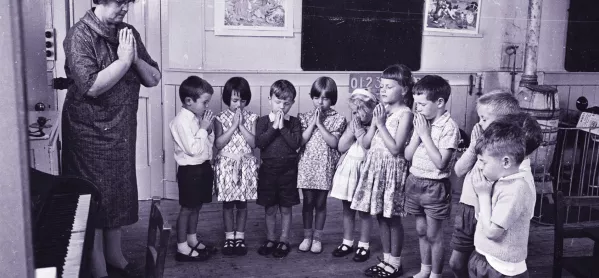So you’ve been asked to teach theology to your primary class.
But where to start?
It can be helpful to approach it like a primary science lesson, looking to cover complex content with an audience-appropriate level of understanding.
Quick read: ‘Religious education needs a rebrand - it should be fascinating, challenging and hard’
Quick listen: How much of your lesson should be teacher talk?
Want to know more? How social media can improve learning
Ideas in science are still being investigated and, like theology, there are not yet definite answers to some questions.
In theology, there are questions that have been debated for the last 4,000 years with no answers decided upon at all.
Questions of personal faith can, of course, be sensitive, and you may prefer not to discuss them in public - let alone in front of 32 children. It’s often better, then, to leave personal experience at the classroom door and approach the lesson with a clean slate.
How to plan a primary theology lesson
It can be helpful to approach theology planning in the same way you would approach a guided reading lesson:
-
Read the part of the religious text you will be teaching. Try to read it without preconception or focus.
-
Write down your questions (Why did God separate the waters to make the sky? What is the significance of the lotus flower in Hinduism? and so on)
-
Get researching. Investigate when and where a text was written and by whom. When was this text first codified? How long was it an oral tradition? What could have been altered in the interim? Is there more than one version of this story told from different perspectives?
-
Revisit your outcomes for the lesson/unit. Has your reading and research altered your ideas of what you had planned to teach?
As you plan your lessons, think about questions to discuss with children. With no clear answers to some theological dilemmas, we can be left with more questions than we started with - and that is brilliant.
How to teach a primary theology lesson
Nonetheless, teaching theology can be nerve-racking. What if a child asks a question you can’t answer? What if they express a controversial viewpoint? What if children disagree with each other?
Here’s a simple structure that can work well:
-
Get children discussing the key ideas they will see in the text ahead of reading it. It is helpful to not use the technical names for concepts at this point.
-
Read the text. Read without a focus so there are no preconceptions. If it is a big passage, read as a class or choose a simpler translation like Good News.
-
Discuss initial observations.
-
Reread the text with a focus. This second reading is important; children will have missed concepts in their first pass (you may want a third or fourth reading, too).
-
Discuss questions that address the reading focus (allow lots of time for this).
Lessons may go off on tangents due to questions, and superb learning can be found in following these rabbit holes and seeing where the conversation leads.
What stories from other traditions does this text remind you of? Why do you think this creation myth starts with water and darkness like the Hindu one? Were there really three kings in the Christmas story?
If children wish to debate a concept, encourage the respectful sharing of views that are supported by observations from the text or prior learning. Encourage them to follow on from and build on each others’ points rather than simply sharing their ideas.
Ultimately, try to think of theology as a verb. If you are discussing ideas about God or gods, or reading and discussing a religious texts, then you are doing theology.
Keep the exploration and discussions academic: religious education is about education, not acts of worship. And don’t worry if it doesn’t turn out as you first expected.
The nature of the subject matter means that discussing the concepts and texts with children can challenge and deepen your own understanding, as well as theirs.
It may well be that by the end of the lesson you have a completely different and contradictory view than you did at the start.
Have a go and get those discussions flowing.
Matthew Lane is a Year 6 teacher and the RE Lead at Hethersett VC Primary School in Norfolk. He tweets @MrMJLane



